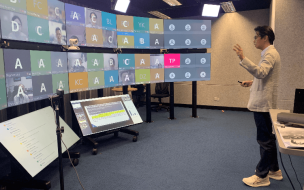There is a concern, they said, that particularly the tech world will be blighted by a shortage of workers with skillsets that include both digital competency and business acumen.
This anxiety is reflected elsewhere, as a study by UK recruiter Robert Walters found that only 11% of employers aren't expecting a shortage of tech skills in the market this year.
Meanwhile, a report by the Organization for Economic Co-operation and Development (OECD) saw that countries like Singapore are already implementing necessary systemic changes in their higher education systems to ensure that the skills that graduates leave with are the same ones demanded by employers.
Many discussions around the skills gap focus on people with management experience but no technical skills, but perhaps an equal problem is technologically-skilled workers who lack the business acumen to take the reins.
“I’m not really in the digital space per se—I’m more technical—but I think both fields can suffer from isolation, in that it’s difficult to break out or have exposure to other areas of the business,” says Lewis McFadyen, CTO at ORII, a voice-powered smart ring company, and an MBA graduate from HKUST Business School in Hong Kong.
Lewis experienced this himself in a previous role, at a factory in China.
“Our clients were often big, blue-chip kind of guys—Procter and Gamble, Unilever—and I was very good at being a project leader and focusing on solutions and idea development,” he recalls.
“One night I went out with one of the VPs of Unilever, and was navigating a conversation around media projects, but as it branched out from there to strategy, suppliers, big goals, I didn’t have anything to contribute, and I wanted to.”
Lewis recognized that as his career progressed these conversations would become more frequent, so he decided to diversify the knowledge in his arsenal by enrolling on the MBA at HKUST in 2015.
Filling the gaps in your skillset
“For me, personally, I saw the change pretty early on,” Lewis says. “Your confidence tends to aggregate with compound interest, and you soon feel that you can contribute to discussions outside of [your immediate experience.]”
Lewis attributes this to the generalist character of the MBA degree at HKUST Business School. The program covers a range of essential topics in its core modules, from finance and consulting to general management, marketing, and entrepreneurship, not to mention the dedicated core module on business technology and analytics.
This portfolio of options offers ample opportunity not only for the more tech-averse to apply their skills in a new arena, but for seasoned technical minds like Lewis to acclimate themselves to the business world. This balancing effect between tech-specific knowledge and broader business and human understanding is key, as studies indicate that in the future of tech, balancing tech expertise with a people-centric approach will be essential.
“[The MBA] is a form of bridge, really,” says Lewis. “It doesn’t make you an expert in any area, but makes you a generalist in a lot of areas.
“Especially in today’s workplace, you need to have bridging skills—a lot more barriers are being broken down [between industries].”
Learning to critically combine your knowledge
But the MBA at HKUST is not just a fill-in-the-blanks exercise in terms of business knowledge. On the contrary, Lewis emphasizes that a key thing that the program offers students is the ability to critically cross-examine a business challenge using different knowledge bases.
“You have a value in terms of how you could link management into technical, or technical into legal,” he explains. “For example, with AI—how are you looking at legal frameworks in computer science?"
Gaining an understanding how different disciplines intersect and interrelate like this is one of Lewis's highlights from his MBA. This knowledge comes in handy in his role as CTO at ORII, a tech startup based in Hong Kong. In helping to lead a small company, the broader toolkit he gained at HKUST Business School is very helpful.
“It’s like if you’re camping, you need a Swiss Army Knife because you don’t know what’s coming,” he says. “That’s a good fit for an MBA, because it equips you generally.”
To MBAs wanting to use their degrees to enter the tech sector, Lewis says to go for it.
“I think this is a great time to get into tech,” he says. “The advent of computing democratized a lot of business—it’s not just large companies that can achieve things, a lot of barriers are being broken down.”
The MBA as a route into the business side of technology is something that Lewis is positive about.
“MBAs are an investment, and not just for ROI,” he says. “It’s a different way of thinking over the next 10, 20, 30, 40, 50 years of your working life.
“We’re living to 100 now! You’ve got a way to go, and you’re only going to see more change coming.”
Student Reviews
HKUST Business School









